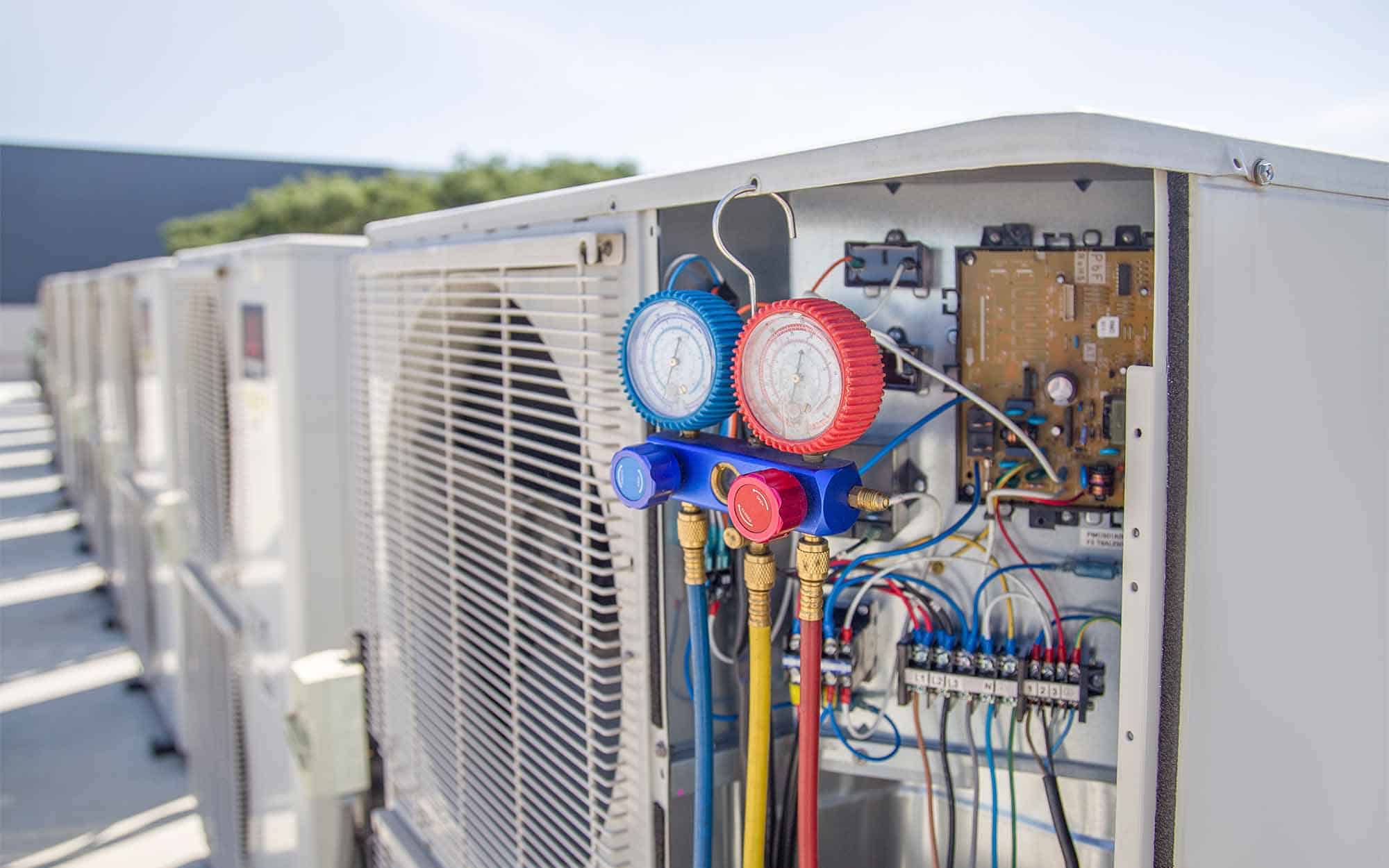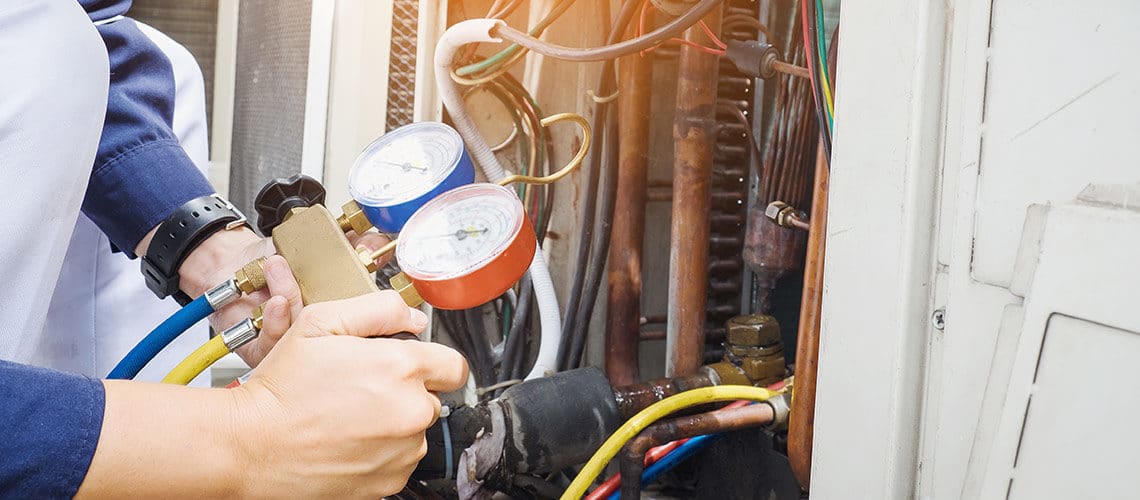The Ultimate Overview to Troubleshooting Common A/c and Air Conditioning Issues
House owners frequently run into numerous concerns, from insufficient air conditioning to complicated audios rising from their devices. Identifying when a concern exceeds standard solutions can be just as critical.
Usual Cooling And Heating Troubles
Determining usual Heating and cooling troubles is important for maintaining a comfortable indoor setting. Homeowners commonly encounter concerns that can disrupt heating, air flow, and air conditioning systems.
An additional constant problem is refrigerant leakages, which compromise the effectiveness of cooling devices. Insufficient refrigerant levels can trigger systems to struggle in cooling areas, bring about greater functional costs and potential lasting damages. Additionally, thermostat malfunctions can result in incorrect temperature level law, causing discomfort and extreme energy usage.
Attending to these concerns promptly is essential to protect against additional damage and ensure optimal system performance. Normal maintenance and prompt medical diagnosis of these usual Heating and cooling issues can substantially improve the reliability and performance of heating and cooling systems, ultimately adding to a much more comfy living atmosphere. air conditioner repair.

Indicators of AC Issues
Recognizing the signs of cooling issues is vital for guaranteeing optimal performance and comfort in your house. Among one of the most instant signs is inadequate air conditioning; if your a/c system is not offering the expected level of air conditioning, it can symbolize reduced refrigerant degrees, a falling short compressor, or blocked filters. Additionally, if you notice uncommon sounds-- such as grinding, screeching, or rattling-- this might suggest mechanical problems that require punctual interest.
Another crucial indicator is a rise in power expenses without a matching change in use. This ineffectiveness typically indicates underlying concerns, such as dirt build-up in the coils or ductwork leakages. If you spot undesirable odors rising from the system, it could be an indication of mold development or electrical problems, both of which need instant evaluation.
Finally, regular cycling on and off, known as short-cycling, can suggest problems with the thermostat or an incorrectly sized device. By being cautious about these indicators, you can address air conditioner problems early, ensuring a comfortable setting and extending the life of your air conditioning system.
Step-by-Step Troubleshooting
When your air conditioning system starts to underperform, it's vital to damage down the repairing procedure right into convenient actions. If the setups are appropriate, examine the air filter; an unclean or clogged up filter can significantly hinder air flow and effectiveness.
Following, examine the circuit breaker or fuse box for tripped breakers or blown merges. If the breaker has tripped, reset read more it, however watch on it; if it trips again, there may be a much deeper electrical concern.
Inspect the exterior unit for particles, such as fallen leaves or dust, which can block air flow. Ensure the device is clear and that the fins are not curved.
Preventive Upkeep Tips

Begin by organizing professional assessments at the very least once a year. Throughout these examinations, service technicians can determine and address possible concerns before they escalate. Furthermore, change air filters every 1-3 months to boost air quality and system effectiveness. Stopped up filters limit air movement, forcing your system to work more difficult.
Maintain the exterior unit clear of debris, such as leaves and dirt, which can hinder airflow. Cut surrounding greenery to preserve a minimum of 2 feet of clearance (residential hvac company). Inspect and clean up the condensate drain to avoid water damage and mold development
Evaluate insulation around air ducts, guaranteeing it stays intact to stop energy loss. Consider a programmable thermostat to maximize power use according to your schedule.
Lastly, check your system's efficiency regularly, keeping in mind go any kind of uncommon sounds or modifications in temperature. Proactive measures are crucial in keeping an effective cooling and heating system, eventually causing lower power expenses and enhanced convenience.
When to Call an Expert
Knowing when to call a professional for heating and cooling issues can conserve you time, money, and unneeded tension. While some small issues may be dealt with via do it yourself troubleshooting, certain indicators suggest that expert treatment is required. If you experience inconsistent temperatures throughout your home, uncommon sounds from your a/c system, or persistent smells, it is essential to look for expert assistance.
In addition, if your unit falls short to start or regularly cycles on and off, these may be signs of even more severe underlying issues that need specialized expertise and tools (hvac). Refrigerant leaks, electric breakdowns, or concerns with the compressor can make complex fixings and might posture safety risks
An additional important variable is the age of your system. If your a/c unit is over 10 years old and displays repeated problems, seeking advice from a professional for an extensive analysis can aid determine whether fixing or replacement is extra cost-efficient. If you lack the convenience or experience to handle intricate fixings, it's prudent to depend on a certified specialist.
Ultimately, focusing on security and efficiency is critical. When their explanation unsure, err on the side of caution and get in touch with an expert to ensure your HVAC system runs efficiently.
Conclusion
In final thought, effectively repairing common HVAC and Air conditioning concerns requires an organized method to recognize issues, implement detailed remedies, and prioritize preventative upkeep. Recognizing indicators of malfunction can stop minor issues from escalating into substantial repair work.